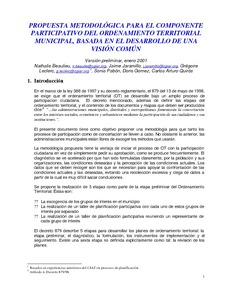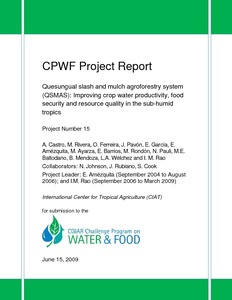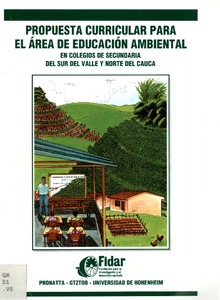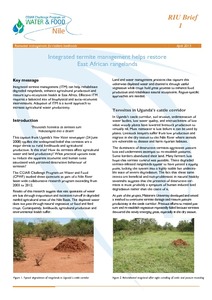Proceedings of the Workshop on Irrigation in West Africa: Current Status and a View to the Future, Ouagadougou, Burkina Faso, 1-2 December 2010
Propuesta metodológica para el componente participativo del ordenamiento territorial municipal basada en el desarrollo de una visión común
Quesungual slash and mulch agroforestry system (QSMAS): Improving crop water productivity, food security and resource quality in the sub-humid tropics
The knowledge and principles generated by CPWF-PN15 confirm that QSMAS can be a model production system for implementing conservation agriculture to achieve food security and sustainable development in drought-prone areas of hillsides in the sub-humid tropics, while providing ecosystem services in the face of land degradation and climate change. As an adoptable option to replace the slash and burn traditional system, QSMAS can improve smallholder livelihoods through eco-efficient use and conservation of natural resources.
Promoting forest conservation through ecotourism income?
A principal criterion for classifying a tourism operation as 'ecotourism' is that local residents at the site should receive substantial economic benefits, which serve both to raise local living standards and as enhanced incentives for nature conservation. This paper sets out a methodological framework for analysis of the alleged participation-income-conservation link, and applies it to the Cuyabeno Wildlife Reserve in the Ecuadorian Amazon region.
Promotion de l’aménagement forestier dans la zone de forêt tropicale humide d’Afrique occidentale et centrale anglophone: rapport final
Ce projet financé par le PNUE et mis en oeuvre par le CIFOR s’est intéressé aux forêts tropicales humides d’Afrique occidentale, plus particuliérement au Ghana et au Nigeria, avec des informations complémentaires provenant du Libéria, de Sierra Leone et du Cameroun. L’objectif général était de faire une synthèse de toute l’information disponible sur les formations forestières humides d’Afrique occidentale afin de catalyser les initiatives susceptibles de favoriser l’adoption de principes de gestion durable des forêts dans toute la région. Le rapport se divise en neuf chapitres.
Propuesta curricular para el área de educación ambiental en colegios de secundaria del sur del Valle y norte del Cauca
Red Internacional de Evaluación de Pastos Tropicales RIEPT-Amazonia. Reunión (1, 1990, Lima, Perú). Trabajos presentados
Reduced impact logging guidelines for Indonesia
The principles and practices for forest harvesting in Indonesia (2000) have been developed to provide a uniform set of minimum standards for logging practices in the production and limited production forests in Indonesia. The provide the standard for WHAT is involved in planning and implementing logging activities in natural forest and WHY certain operations should be undertaken. The Reduced Impact Logging (RIL) guidelines for Indonesia provides the mechanism for HOW the standards will be applied in the field or "how to do the work".
Rainwater management for resilient livelihoods: Integrated termite management helps restore East African rangelands
Reduced impact logging guidelines for lowland and hill dipterocarp forest in Indonesia
This report describes Reduced-Impact Logging(RIL) which will be implemented in the lowland and hill dipterocarp forest of the Bulungan Model Forest project in East Kalimantan, Indonesia. It is anticipated that through the implementation and supervision of the RIL practices described in this document, the timber concession operators (INHUTANI II) can expect to: reduce disturbances to soil and residual vegetation by at least 50% in comparison with conventional logging operations where these guidelines are not applied; limit overall direct impacts to the forest





